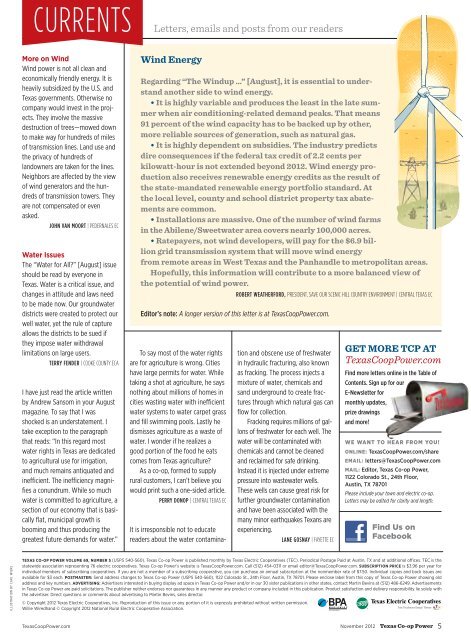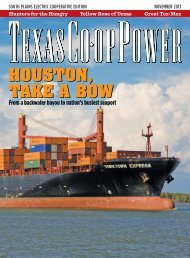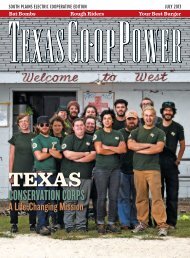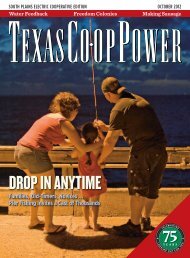November 2012PDF 5.57 MB - South Plains Electric Cooperative
November 2012PDF 5.57 MB - South Plains Electric Cooperative
November 2012PDF 5.57 MB - South Plains Electric Cooperative
Create successful ePaper yourself
Turn your PDF publications into a flip-book with our unique Google optimized e-Paper software.
ILLUSTRATION BY CARL WIENS<br />
CURRENTS<br />
More on Wind<br />
Wind power is not all clean and<br />
economically friendly energy. It is<br />
heavily subsidized by the U.S. and<br />
Texas governments. Otherwise no<br />
company would invest in the projects.<br />
They involve the massive<br />
destruction of trees—mowed down<br />
to make way for hundreds of miles<br />
of transmission lines. Land use and<br />
the privacy of hundreds of<br />
landowners are taken for the lines.<br />
Neighbors are affected by the view<br />
of wind generators and the hundreds<br />
of transmission towers. They<br />
are not compensated or even<br />
asked.<br />
JOHN VAN MOORT | PEDERNALES EC<br />
Water Issues<br />
The “Water for All?” [August] issue<br />
should be read by everyone in<br />
Texas. Water is a critical issue, and<br />
changes in attitude and laws need<br />
to be made now. Our groundwater<br />
districts were created to protect our<br />
well water, yet the rule of capture<br />
allows the districts to be sued if<br />
they impose water withdrawal<br />
limitations on large users.<br />
TERRY FENDER | COOKE COUNTY ECA<br />
I have just read the article written<br />
by Andrew Sansom in your August<br />
magazine. To say that I was<br />
shocked is an understatement. I<br />
take exception to the paragraph<br />
that reads: “In this regard most<br />
water rights in Texas are dedicated<br />
to agricultural use for irrigation,<br />
and much remains antiquated and<br />
inefficient. The inefficiency magnifies<br />
a conundrum. While so much<br />
water is committed to agriculture, a<br />
section of our economy that is basically<br />
flat, municipal growth is<br />
booming and thus producing the<br />
greatest future demands for water.”<br />
Letters, emails and posts from our readers<br />
Wind Energy<br />
Regarding “The Windup …” [August], it is essential to understand<br />
another side to wind energy.<br />
It is highly variable and produces the least in the late summer<br />
when air conditioning-related demand peaks. That means<br />
91 percent of the wind capacity has to be backed up by other,<br />
more reliable sources of generation, such as natural gas.<br />
It is highly dependent on subsidies. The industry predicts<br />
dire consequences if the federal tax credit of 2.2 cents per<br />
kilowatt-hour is not extended beyond 2012. Wind energy production<br />
also receives renewable energy credits as the result of<br />
the state-mandated renewable energy portfolio standard. At<br />
the local level, county and school district property tax abatements<br />
are common.<br />
Installations are massive. One of the number of wind farms<br />
in the Abilene/Sweetwater area covers nearly 100,000 acres.<br />
Ratepayers, not wind developers, will pay for the $6.9 billion<br />
grid transmission system that will move wind energy<br />
from remote areas in West Texas and the Panhandle to metropolitan areas.<br />
Hopefully, this information will contribute to a more balanced view of<br />
the potential of wind power.<br />
ROBERT WEATHERFORD, PRESIDENT, SAVE OUR SCENIC HILL COUNTRY ENVIRONMENT | CENTRAL TEXAS EC<br />
Editor’s note: A longer version of this letter is at TexasCoopPower.com.<br />
To say most of the water rights<br />
are for agriculture is wrong. Cities<br />
have large permits for water. While<br />
taking a shot at agriculture, he says<br />
nothing about millions of homes in<br />
cities wasting water with inefficient<br />
water systems to water carpet grass<br />
and fill swimming pools. Lastly he<br />
dismisses agriculture as a waste of<br />
water. I wonder if he realizes a<br />
good portion of the food he eats<br />
comes from Texas agriculture?<br />
As a co-op, formed to supply<br />
rural customers, I can’t believe you<br />
would print such a one-sided article.<br />
PERRY DONOP | CENTRAL TEXAS EC<br />
It is irresponsible not to educate<br />
readers about the water contamina-<br />
tion and obscene use of freshwater<br />
in hydraulic fracturing, also known<br />
as fracking. The process injects a<br />
mixture of water, chemicals and<br />
sand underground to create fractures<br />
through which natural gas can<br />
flow for collection.<br />
Fracking requires millions of gallons<br />
of freshwater for each well. The<br />
water will be contaminated with<br />
chemicals and cannot be cleaned<br />
and reclaimed for safe drinking.<br />
Instead it is injected under extreme<br />
pressure into wastewater wells.<br />
These wells can cause great risk for<br />
further groundwater contamination<br />
and have been associated with the<br />
many minor earthquakes Texans are<br />
experiencing.<br />
LANE GOSNAY | FAYETTE EC<br />
GET MORE TCP AT<br />
TexasCoopPower.com<br />
Find more letters online in the Table of<br />
Contents. Sign up for our<br />
E-Newsletter for<br />
monthly updates,<br />
prize drawings<br />
and more!<br />
WE WANT TO HEAR FROM YOU!<br />
ONLINE: TexasCoopPower.com/share<br />
EMAIL: letters@TexasCoopPower.com<br />
MAIL: Editor, Texas Co-op Power,<br />
1122 Colorado St., 24th Floor,<br />
Austin, TX 78701<br />
Please include your town and electric co-op.<br />
Letters may be edited for clarity and length.<br />
Find Us on<br />
Facebook<br />
TEXAS CO-OP POWER VOLUME 69, NU<strong>MB</strong>ER 5 (USPS 540-560). Texas Co-op Power is published monthly by Texas <strong>Electric</strong> <strong>Cooperative</strong>s (TEC). Periodical Postage Paid at Austin, TX and at additional offices. TEC is the<br />
statewide association representing 76 electric cooperatives. Texas Co-op Power’s website is TexasCoopPower.com. Call (512) 454-0311 or email editor@TexasCoopPower.com. SUBSCRIPTION PRICE is $3.96 per year for<br />
individual members of subscribing cooperatives. If you are not a member of a subscribing cooperative, you can purchase an annual subscription at the nonmember rate of $7.50. Individual copies and back issues are<br />
available for $3 each. POSTMASTER: Send address changes to Texas Co-op Power (USPS 540-560), 1122 Colorado St., 24th Floor, Austin, TX 78701. Please enclose label from this copy of Texas Co-op Power showing old<br />
address and key numbers. ADVERTISING: Advertisers interested in buying display ad space in Texas Co-op Power and/or in our 30 sister publications in other states, contact Martin Bevins at (512) 486-6249. Advertisements<br />
in Texas Co-op Power are paid solicitations. The publisher neither endorses nor guarantees in any manner any product or company included in this publication. Product satisfaction and delivery responsibility lie solely with<br />
the advertiser. Direct questions or comments about advertising to Martin Bevins, sales director.<br />
© Copyright 2012 Texas <strong>Electric</strong> <strong>Cooperative</strong>s, Inc. Reproduction of this issue or any portion of it is expressly prohibited without written permission.<br />
Willie Wiredhand © Copyright 2012 National Rural <strong>Electric</strong> <strong>Cooperative</strong> Association.<br />
TexasCoopPower.com <strong>November</strong> 2012 Texas Co-op Power 5










